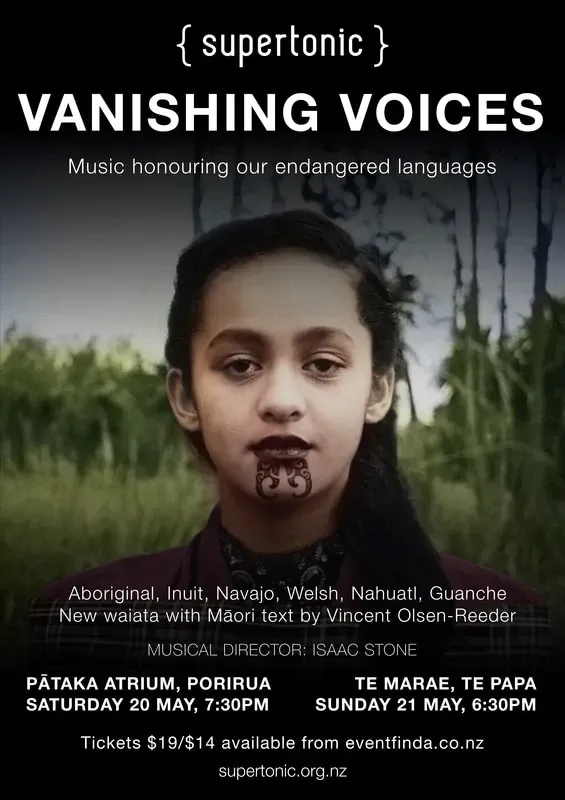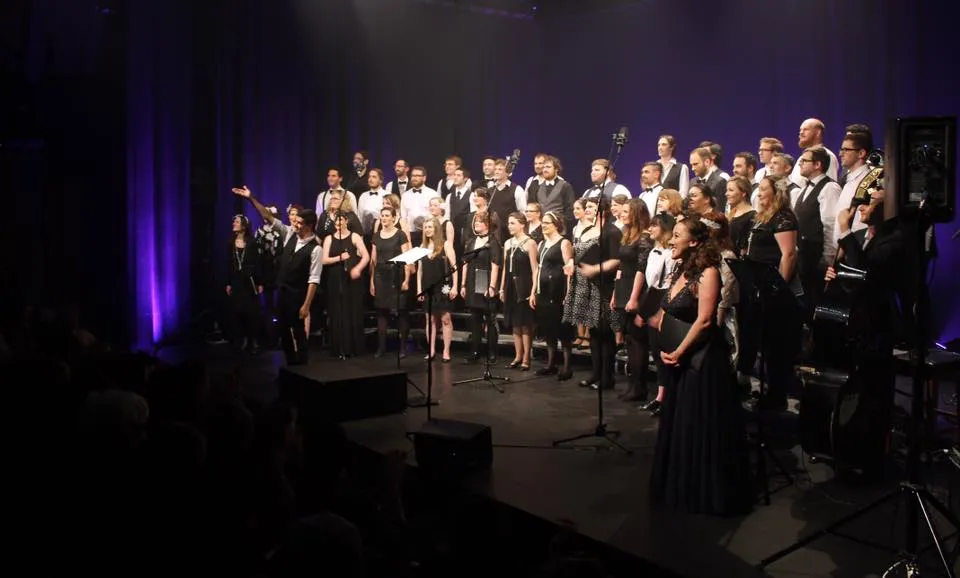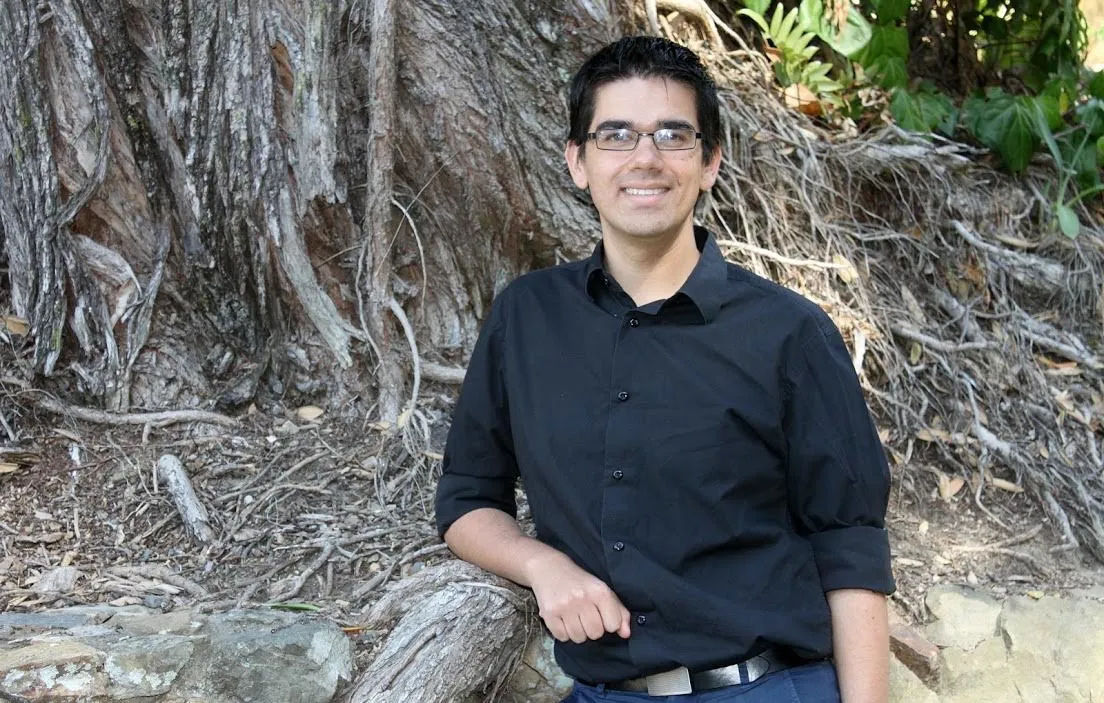Isaac Stone: Vanishing Voices
Written by

“Music is the universal language throughout all cultures no matter the style and the age, music has always played a role in connecting us to our culture and binding us to each other.”
Isaac Stone is a music teacher and choral programme leader at Tawa College in Wellington, and is the musical director of Supertonic, a choir for people in their 20s and 30s. He has combined his passion for music with his reverence of te reo Māori to develop and direct a concert that honours our endangered languages. He sees music as the universal language that speaks across all cultures and therefore a powerful tool for keeping languages alive. Vanishing Voices is a concert that will honour six different endangered or lost languages from across the world.
Since Isaac was a young boy he has always been “fascinated and warmed by te ao Māori and tikanga Māori. One of his favourite things at primary school was singing waiata and he feels lucky that there were kapa haka and language learning opportunities throughout his schooling. At university, Isaac studied music and picked up some te reo Māori papers on the side. This rekindled his love of the language and culture, and it also gave him insight into what it means to feel foreign in your own country. “It was a good atmosphere because in music I was always at the top of the class for whatever reason, while in maori I was always at the bottom of the class because I had no idea what I was doing. I recommend everyone to do that – put yourself in a position where you don’t know what you’re doing.”
There was a particular paper on the history and impact of colonisation that struck a chord with Isaac and the learnings from that paper have remained very real for him ever since. This paper traced the loss of te reo Māori as a language due to social and political policies at the time. “I realised the responsibility that those of us that could do something to help, should do something to help.” As a musician and a teacher he has fortified this commitment by building the regular use of te reo Māori in class and often referring to Māori musicians and songs as the basis for his teaching. “Through music we can push the ability for everyone to be able to participate in te reo Māori. When there’s music and a beat and sound we can connect ourselves to it so much easier.”
‘Vanishing Voices: Music honouring our endangered languages’ is the culmination of Isaac’s musical career and his commitment to being an active part of the revitalisation of te reo Māori. The concert will be performed by the choir he directs, Supertonic Choir, and will showcase songs in six threatened and extinct indigenous languages. “Through music, which is the language that all cultures speak, we can bring back the languages that need a helping hand.” Isaac has found in his research that there is so much that can be learned about a culture through its music. “Just as you can’t separate a language from the culture in which it was created, you can't separate music from the culture in which it is created … There is so much about a culture that is written into music … All music, but especially choral music, is a representation of the time that it was written and the people who wrote it. Through performing this music we get to glimpse into the world of another culture.”
Isaac spent a long period of time in the lead up to creating Vanishing Voices researching why languages have suffered in the world. He found that language loss always starts with an invasion of some sort and that it was then factors such as aggressive colonial policies, urbanisation and geographic isolation that could often lead to the loss of a language within as little as two generations. He wanted to make sure that through this concert people would get an insight into the plight that languages have suffered and continue to suffer universally.
Finding the right pieces was a hard journey and it took Isaac “hours and hours and hours to find each piece.” Fitting them into a programme that worked was an equally time consuming project. Isaac set himself ambitious goals to find a good balance of music to be performed, that combined to create a unified experience in a concert context, with music that was at an appropriate level for the choir - something that was challenging but not unachievable. He was also determined to include a diversity of languages representing multiple cultures that told important stories and held meanings that would impact people deeply upon hearing them.
In the end, Isaac has gathered a collection of pieces that are performed in Aboriginal (Australia), Inuit (Canada), Navajo (USA), Welsh (Wales), Nahuati (Mexico), Guanche (Canary Islands) and te reo Māori. These songs collectively weave together stories of different peoples that are unique to their culture but also connect across all languages. “Every culture has version of tangible things that are important for it … [it was] interesting to see the different values and yet similar values that connect so many languages.”
One piece to be performed, Aica Maraga, is in Guanche and tells the harrowing story of the invasion of the Canary Islands by Spanish conquerors. The song laments the horrifying deaths of their loved ones at the hands of the invaders and the heart-breaking realisation of those left behind that in order to survive as a people they would have to marry into the invading population. The Guanche language of the Canary Islands no longer exists.
The piece in Inuit, Snowforms, honours the many different types of snow that are essential to the life of the Inuit people. “This piece uses so many different words for forms of snow. If we were to lose this language we would lose all that knowledge that has built up by humans living and learning in that environment.” Isaac explains that through sharing this music he hopes that people will begin to understand the significance of these languages to all people. They hold knowledge, stories, culture and history that is relevant across humanity.
Central to the concert are a set of works that have come out of a collaboration between Isaac and a young Māori scholar, Vincent Olsen-Reeder. The new works combine Vincent’s poetry with Isaac’s composition culminating a new song cycle that places te reo Māori at the heart of the concert. For Isaac, this was a challenge that brought him much joy. “It is strange when you already have a creative aspect and you’re adding a creative aspect to it, especially in a language that I am familiar with but not fluent in. I had to think about each word individually when writing the music, but also make sure the message of the poem as a whole was being told in the music … usually my skills aren’t high enough to participate in this but through the universal language of music I was able to be part of something that is phrased beautifully in this language.”
And true to the teacher in him, Isaac is using this concert as an opportunity to empower rangatahi - the concert will be hosted by two young Māori music students from Tawa College. He sees the event as an opportunity to “put rangatahi in a powerful and responsible position in a place where they could be really proud of their culture and heritage.”
Vanishing Voices will be performed at Pātaka in Porirua and Te Marae at Te Papa in Wellington at the end of May. Isaac hopes that these concerts will open a conversation about the importance of protecting our endangered languages and the knowledge and cultural significance that they intrinsically hold. He anticipates that through the music, people will be able connect to the languages at a level where they can identify their significance to all of us, and that this will have a longer reaching benefit here in Aotearoa, New Zealand. “I want people to feel that we can do something about the loss of language, especially here in New Zealand. This is part of my contribution to saving te reo Māori.”
Vanishing Voices: Music honouring our endangered languages has the following performances:
- Pātaka Museum, Porirua - Saturday 20 May, 7:30pm (sold out)
- Te Marae, Te Papa - Sunday 21 May, 6:30pm

